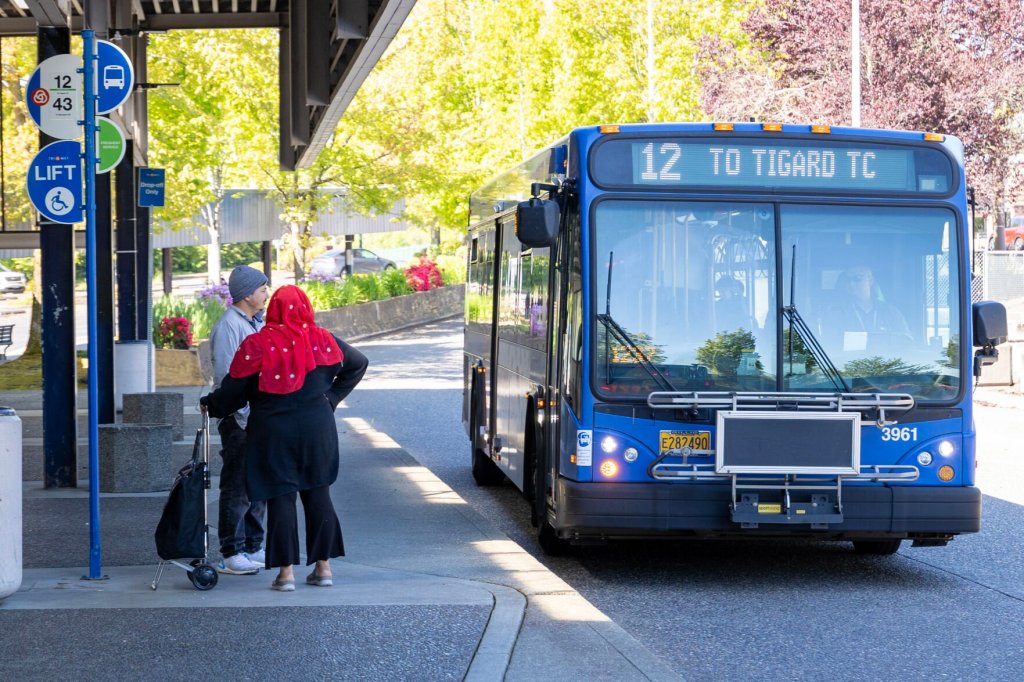With TriMet cuts looming, riders in Washington County face uncertainty
Published 4:30 am Friday, August 1, 2025

- TriMet plans to cut services starting this fall as it looks to address a budget shortfall. (Jaime Valdez/News-Times)
TriMet plans to put the brakes on at least 10% of its transit services over the next two years in the face of a projected budget shortfall — but how those reductions will impact Washington County travelers isn’t yet in clear view.
Buses will not run as often, MAX Light Rail service will decrease and some routes could be eliminated entirely as TriMet looks to reduce its spending. Transit officials have not yet specified if lines serving Hillsboro, Forest Grove, Beaverton or other parts of the westside will feel the effects.
The Portland-area transit agency announced it will begin making service cuts starting Nov. 30, after the Oregon Legislature did not pass House Bill 2025 in June. Known as the Oregon Transportation Reinvestment Package, the bill sought to raise billions for state and local transportation needs by hiking the state’s gas tax and other fees.
Trending
For TriMet and other transit providers, the bill also included a 0.2 percentage point increase in the Statewide Transportation Improvement Fund payroll tax over five years — which could have provided revenue to help preserve service levels, according to the agency.
Without that funding, TriMet is moving ahead with a phased plan to close a projected $300 million gap between expenditures and revenues by 2027.
“We are facing a fiscal cliff in 2030, so we must act now to balance our budget for the long term,” TriMet General Manager Sam Desue Jr. said in a release. “As Oregon’s largest public transit provider, we have a tremendous responsibility to keep people in our region moving. Cutting service now means avoiding sudden, catastrophic cuts in the future.”
What’s on the chopping block — and what isn’t yet clear
Initial cuts starting this fall will focus on reducing frequency during early morning and late evening hours on some frequent-service bus lines (there are currently five that serve Washington County). Up to eight additional routes will also see all-day frequency reductions.
The next phase, expected in March 2026, includes paring back or eliminating evening service on low-ridership lines, rerouting some buses and shortening the MAX Green Line to operate only between Clackamas Town Center and Gateway Transit Center.
From May 2026 to August 2027, TriMet says more cuts will be necessary to meet its 10% reduction target. If new revenue sources aren’t secured, additional cuts beyond 10% could follow — including reduced frequency on all MAX lines during parts of the day and potentially eliminating entire bus routes or segments.
Trending
TriMet’s paratransit service, LIFT, will also be scaled back in line with changes to fixed-route service.
As of now, the specific lines affected have not been confirmed, and it’s unclear how the coming cuts will affect riders in Washington County who rely on public transit to reach work, school and other destinations. If reductions eventually extend to all MAX lines, travelers boarding the Blue Line at Beaverton Transit Center — or the newly extended Red Line at Hillsboro’s Airport/Fairgrounds Station — may also need to adjust their routines.
“Once we have specifics on the lines that would be affected, we will make them public,” a TriMet public information officer told the News-Times.
A loss of jobs and an increase in fare
In line with reducing services, TriMet plans to eliminate at least 140 operator positions, with additional cuts in maintenance and support roles. A broader staffing analysis is also underway, expected to result in reductions to administrative jobs.
The agency has announced a hiring freeze, with only essential positions being filled.
To soften the blow of future cuts, TriMet has identified two potential sources of increased revenue: an increase in the Statewide Transportation Improvement Fund and a fare hike.
While no fare increases are planned immediately, TriMet has outlined a potential change in fall 2028 that would raise adult fares by 20 cents and youth and Honored Citizen fares by 10 cents — which would make a ticket for a full-day ride cost $6 and $3, respectively.
If those efforts fall short, the agency warns it will need to cut an additional $48 million in service and spending.
Updates about reductions and details on community engagement efforts are available at trimet.org/budgetcuts.







